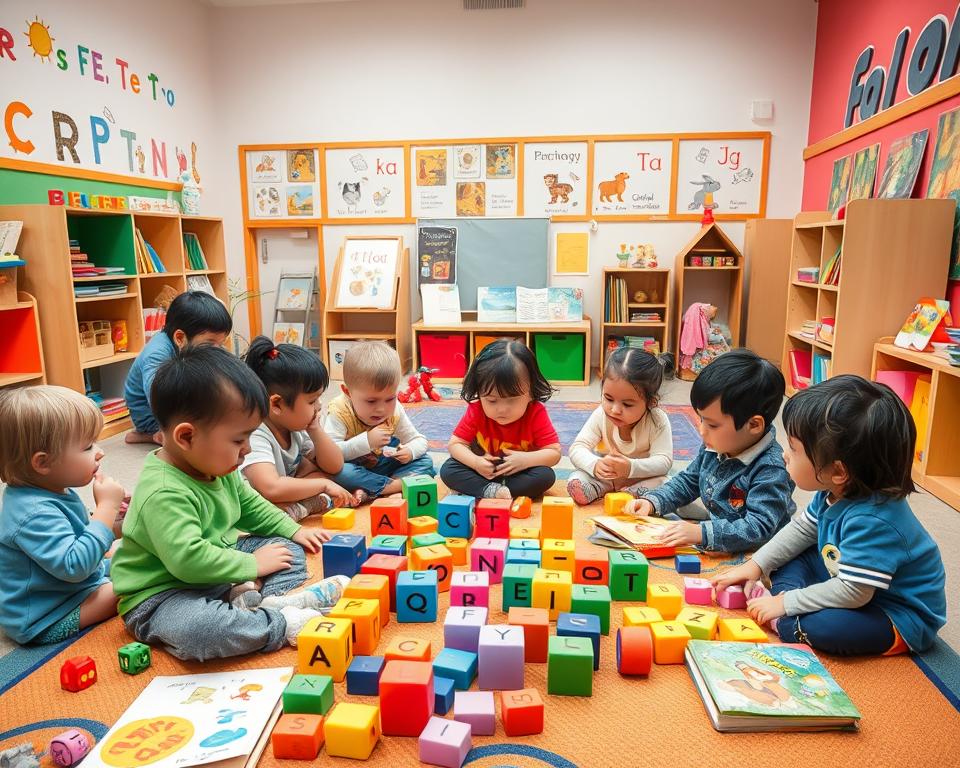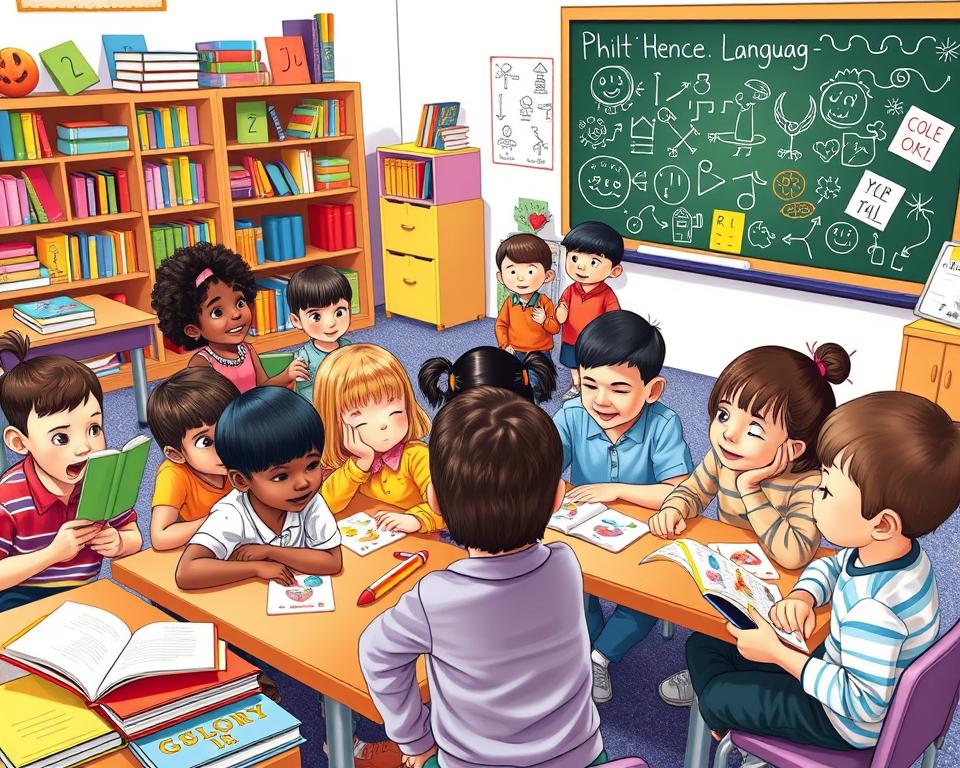A child’s vocabulary at age 2 can predict their language skills up to 5th grade. This shows how crucial thematic vocabulary lessons are for kids early on. Fun and interactive lessons can boost their language skills, helping them succeed in school and life like these 10 thematic vocabulary lessons for kids in this article.
These lessons help kids improve their vocabulary, understanding, and speaking skills. Activities like word searches, storytelling, and vocabulary Bingo make learning fun. By adding these activities to their daily routine, kids build a strong language foundation. This is key for their future success.
Understanding the Power of Thematic Vocabulary Lessons for Kids
Thematic vocabulary lessons make learning fun for kids. They teach new words in a way that’s interesting and relevant. This approach helps kids understand language better and boosts their communication skills.
Studies show that learning words in context is key. Thematic lessons do just that. They offer interactive vocabulary exercises for kids that fit different learning styles. This makes vocabulary learning effective and enjoyable.
Teaching vocabulary effectively involves several strategies. Reading aloud, one-on-one reading sessions, and using poetry are some of them. These methods help kids grasp language and improve their speaking and writing.
Thematic vocabulary lessons are a great way to teach kids new words. They make learning fun and engaging. With the right approach, kids can develop a strong language foundation and improve their communication skills.
10 Thematic Vocabulary Lessons for Kids
Building vocabulary is an essential part of language development for kids. One fun and effective way to help children expand their vocabulary is by incorporating thematic lessons into their language learning. Thematic vocabulary lessons not only make learning more engaging and interesting but also help children make connections between words and concepts. Here are 10 creative thematic vocabulary lessons for kids to boost their language skills:
1. Animal Kingdom: Introduce kids to a variety of animals and their names. Take them on a virtual safari, show them pictures, and have them match the animal with its name. Encourage them to describe the animals using adjectives.
2. Outer Space Adventures: Teach kids about the solar system and space-related vocabulary. Have them create their own planets and name them, using descriptive words like “fiery,” “icy,” or “mysterious.”
3. Under the Sea Exploration: Dive into the underwater world and learn about marine creatures. Have kids practice saying and spelling the names of different sea creatures like jellyfish, seahorse, and octopus.
4. Superheroes and Villains: Introduce kids to superhero and villain vocabulary. Have them create their own superhero characters and describe their superpowers using creative adjectives.
5. Fairy Tale Fantasies: Explore fairy tales and magical creatures like witches, dragons, and fairies. Have kids act out scenes from their favorite fairy tales and use descriptive language to describe the characters and settings.
6. Foodie Fun: Teach kids about different types of foods and cooking vocabulary. Have them practice writing recipes or creating their own menus using food-related words.
7. Weather Wonders: Learn about different types of weather and weather-related vocabulary. Have kids create their own weather forecasts and describe the weather using descriptive adjectives.
8. Pirate Adventures: Set sail on a pirate adventure and learn pirate-themed vocabulary. Have kids create their own pirate names and describe their pirate ships using colorful language.
9. Sports Spectacular: Explore different sports and sports-related vocabulary. Have kids create their own sports teams and come up with team names using creative words.
10. Dinosaur Discovery: Go back in time to the age of dinosaurs and learn about prehistoric creatures. Have kids research different types of dinosaurs and create their own dinosaur names using imaginative language.
By incorporating these thematic vocabulary lessons into your child’s language learning, you can help them boost their language skills while having fun and being creative. Encourage kids to use their new vocabulary in everyday conversations and activities to reinforce their learning. With practice and repetition, children will expand their vocabulary and become more confident communicators.
Essential Tools and Materials for Vocabulary Teaching
To teach vocabulary effectively, you need the right tools and materials. Engaging vocabulary resources for kids are key to their learning. These include educational games, activities, and interactive lessons for various learning styles.
Flashcards, word searches, and crossword puzzles are great tools. They make learning fun and interactive for kids. Educational vocabulary games also help reinforce new words and practice language skills in a fun way.
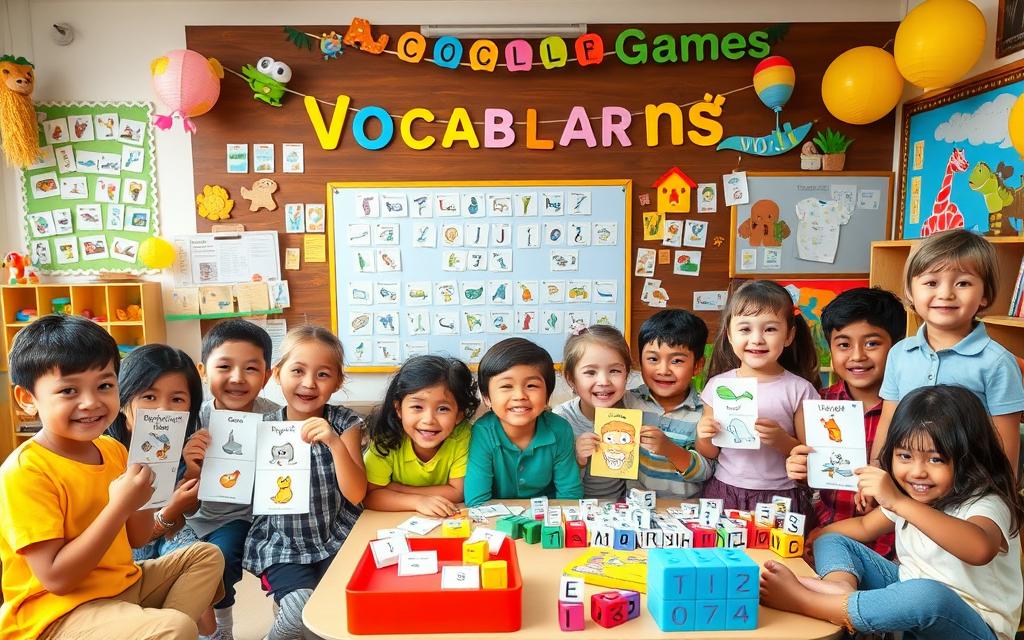
Choosing the right materials is crucial. Stimulating vocabulary activities for children can be hands-on, like making vocabulary cards or playing games. These activities help kids understand word meanings and improve their language skills. Using these tools and materials can make your teaching more engaging and effective.
When picking vocabulary teaching materials, consider a few things:
- Make sure they align with your learning goals.
- Choose materials that match your students’ interests and needs.
- Look for opportunities for interactive and engaging learning.
- Ensure the materials support different learning styles and abilities.
Creating an Engaging Learning Environment
Creating a fun and engaging learning space is key for kids to love learning. This can be done by adding interactive vocabulary exercises for kids to their daily lessons. It makes learning fun and keeps kids motivated and focused.
Studies show that captivating vocabulary lessons for young learners boost their language skills. Using engaging vocabulary resources for kids like games and quizzes can help them remember new words better. Hands-on activities and group talks also help kids remember more than just sitting in class.
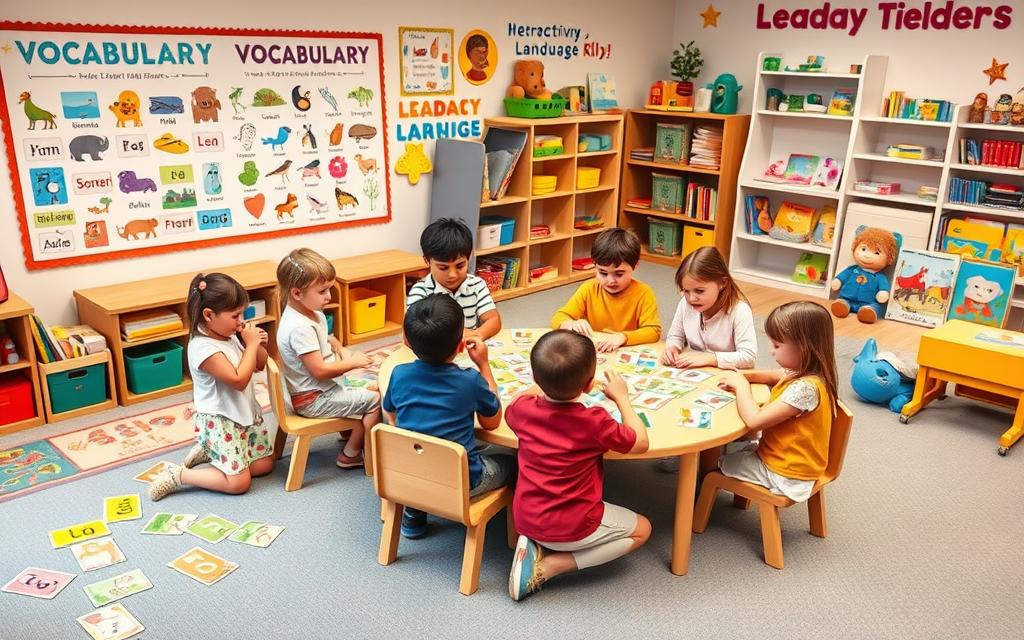
- Teach vocabulary in real-world contexts and with synonyms.
- Add games and interactive activities to lessons.
- Use different senses to help kids learn new words.
- Encourage kids to teach each other and discuss in groups.
By using these methods, teachers and parents can make learning fun and supportive. This helps kids develop a love for learning and succeed in school.
Nature and Animals Theme: Wildlife Vocabulary Adventure
Thematic vocabulary lessons for kids can be super fun. They use a nature and animals theme. Kids learn about animals, their homes, and why we need to protect them. These lessons make learning fun and exciting.
Activities can focus on many nature and animal topics. For example, kids can learn about animal coverings and habitats. They can even play games like “Wild Animals Tail Matching Activity” and “Animals and Their Houses Matching Game”.
Studies show these methods work well. About 85% of teachers use KWL charts to check what kids know. Writing prompts can boost vocabulary by 25% for kids in grades 1 to 4. Lessons about rainforest species can also get kids more involved by 40%.

By using thematic lessons, activities, and games, teachers can make learning fun. This way, kids not only learn new words but also grow to love nature and animals.
Food and Cooking: Kitchen Language Discovery
Cooking is a great way to teach kids new words and ideas. It makes learning fun and meaningful. Kids can learn through real-life examples, like cooking and food.
Using the food and cooking theme helps kids improve in math, science, and reading. They can practice measuring and pouring, starting with simple counting for toddlers. Older kids can learn about fractions. Cooking also makes kids more open to trying new foods.
Some examples of educational vocabulary games and activities that can be used in the kitchen include:
- Matching recipes with ingredients and cooking instructions
- Creating a vocabulary list of cooking-related words, such as “whisk” and “simmer”
- Practicing measurement skills by measuring out ingredients
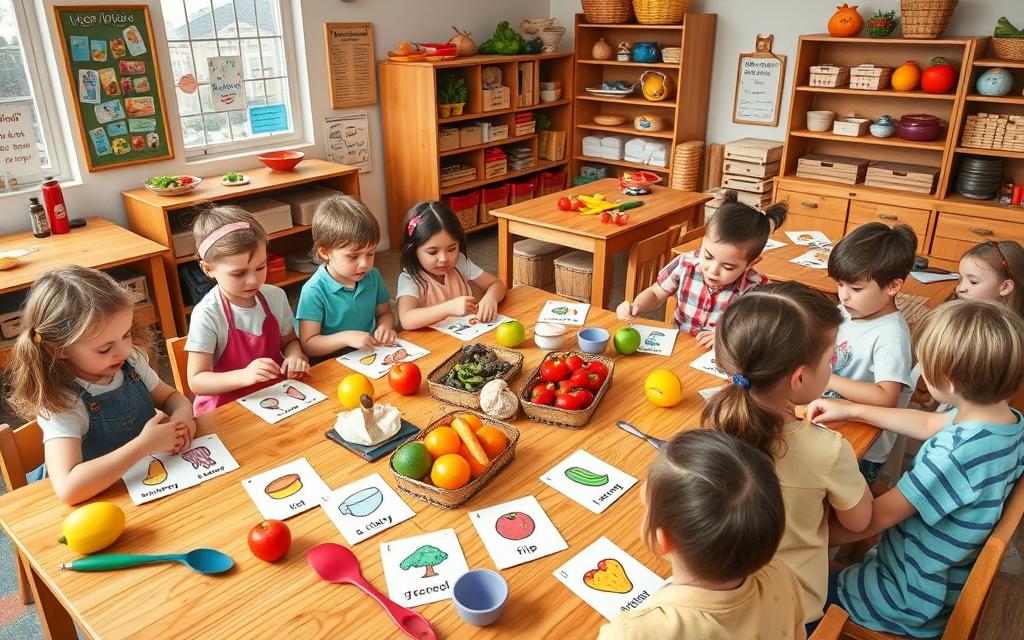
Cooking opens doors to learning about other cultures, enhancing social studies. It also strengthens family bonds through shared experiences. This theme is perfect for making learning vocabulary fun and engaging for kids.
Community Helpers: Professional Vocabulary Building
Learning about community helpers can help kids understand language better. They can learn new words and concepts in a fun way. Activities like role-playing and storytelling make learning exciting.
Real-world examples can make vocabulary lessons for kids more interesting. For example, they can learn about doctors, teachers, and firefighters. Picture books and games can also teach new words and ideas.
Some examples of community helpers include:
- Neighborhood helpers, such as mail carriers and librarians
- Safety helpers, such as police officers and firefighters
- Builders and fixers, such as architects and engineers
Interactive methods like carpet games and puzzles help kids learn. For instance, puzzles about tools used by helpers can be very helpful.

Using fun and interactive ways to teach vocabulary can make learning effective. This helps kids build a strong language foundation. It prepares them for future success in school.
Weather and Seasons: Natural Phenomena Word Play
Exploring weather and seasons is a fun way to teach kids new words and ideas. It’s perfect for thematic vocabulary lessons for kids. Kids learn about different weather and seasons, which helps them understand language better.
Children’s vocabulary building activities can be fun and interactive. For example, kids can make a mini-cloud in a jar or create rain with a simple experiment. These activities help kids learn language and science in a fun way.
Some examples of thematic vocabulary lessons for kids include:
- Creating a weather wheel to learn about different types of weather
- Making a seasonal calendar to learn about the changing seasons
- Conducting experiments to learn about cloud formation and precipitation
Teachers can make learning fun and engaging by adding these activities. This helps kids develop a strong foundation in language and science.
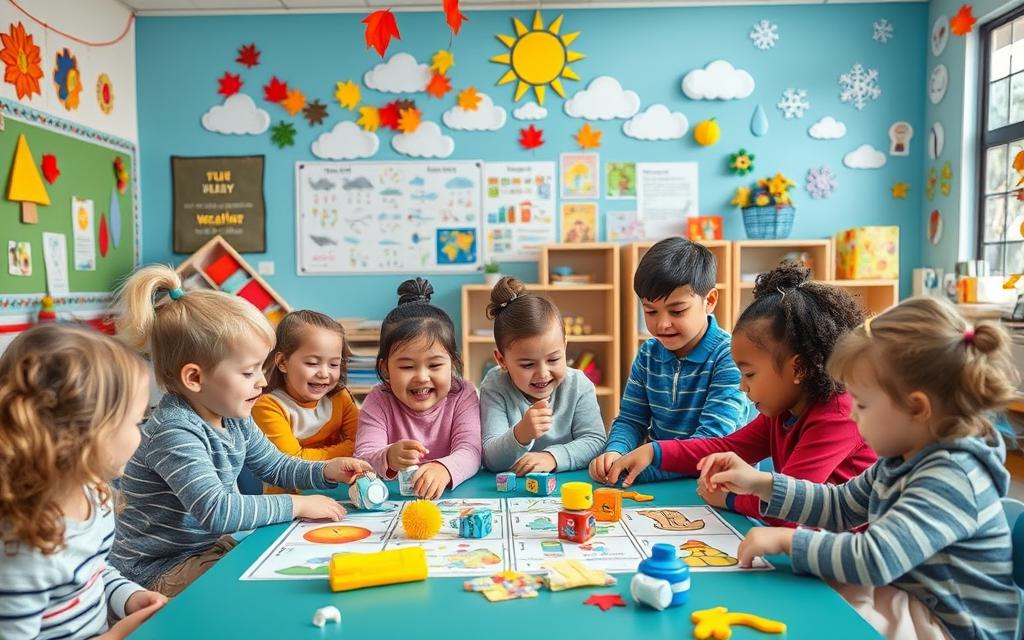
Transportation and Travel: Journey Through Words
Learning about transportation and travel can be fun for kids. It introduces them to new words and ideas. Educational vocabulary games help them learn about cars, buses, trains, and airplanes in a fun way. These games make learning interactive and meaningful.
There are many engaging vocabulary resources for kids out there. You can find worksheets, flashcards, and songs that teach about travel. These tools make learning fun and interactive, fitting different learning styles.

Using real-life examples makes learning more effective. For example, a lesson might talk about safety and responsibility when traveling. It can also cover different vehicles and transportation systems. This helps kids understand and apply what they learn in a practical way.
Using the transportation and travel theme has many benefits. It improves vocabulary retention through fun activities. It also boosts critical thinking and problem-solving skills through real-life examples. Plus, it makes learning more enjoyable with educational vocabulary games and engaging vocabulary resources for kids.
- Improved vocabulary retention through interactive and engaging activities
- Developed critical thinking and problem-solving skills through real-life scenarios and examples
- Enhanced learning experience through the use of educational vocabulary games and engaging vocabulary resources for kids
Empowering Young Minds Through Creative Vocabulary Learning
As we wrap up these creative vocabulary lessons, it’s clear that they can change young minds. By using interactive vocabulary exercises for kids, captivating vocabulary lessons for young learners, and engaging vocabulary resources for kids, we help them love language. This sets them up for success in school and life.
Studies show that knowing lots of words is key for reading well and doing well in school. Kids learn about 3,000 new words each school year. Teachers can make a big difference by focusing on these words in class.
By making learning fun and engaging, we can help kids love language. This way, they get the tools they need to do well in school and beyond.
Bonus Thematic Vocabulary Lessons for Kids
Teaching vocabulary through themes is a powerful way to make learning meaningful and engaging for kids. Whether you’re a teacher or a homeschooling parent, thematic vocabulary lessons can immerse children in relatable and exciting contexts, helping them grasp new words effortlessly. Here’s a comprehensive guide to implementing creative thematic vocabulary lessons:
1. Animal Adventures
Why It Works: Animals are universally loved by children, making this theme an instant hit.
Activities:
- Word Matching: Match animals with their habitats (e.g., “lion” with “savannah”).
- Animal Sounds and Actions: Play charades where kids act out or mimic animal sounds while naming them in the target language.
- Story Creation: Create simple animal stories using the vocabulary, helping kids practice word usage in context.
2. Food Fun
Why It Works: Food is a practical theme that connects to kids’ daily lives.
Activities:
- Role-Playing: Set up a pretend restaurant or grocery store where kids use vocabulary for ordering or buying food.
- Cooking Vocabulary: Combine cooking sessions with learning words for ingredients, utensils, and actions like “stir” or “pour.”
- Sorting Games: Sort foods by categories, like fruits, vegetables, and dairy.
3. Seasons and Weather
Why It Works: Kids naturally observe seasonal changes and weather patterns.
Activities:
- Weather Journal: Have kids record the weather daily using new vocabulary like “sunny,” “rainy,” or “cloudy.”
- Seasonal Crafts: Create crafts like snowflakes for winter or flowers for spring while discussing related words.
- Interactive Songs: Sing weather-related songs to reinforce vocabulary in a fun way.
4. Transportation and Travel
Why It Works: This theme taps into kids’ curiosity about vehicles and places.
Activities:
- Vehicle Bingo: Create a bingo game with pictures of cars, planes, and trains.
- Map Exploration: Use maps to learn vocabulary for modes of transportation and destinations.
- Travel Scenarios: Pretend to plan a trip, teaching words like “ticket,” “luggage,” or “train station.”
5. My Family and Friends
Why It Works: Personal connections make learning meaningful.
Activities:
- Family Tree: Create a family tree using words like “mother,” “father,” “sister,” or “cousin.”
- Photo Albums: Use photos to label family members and describe them.
- Role-Playing Games: Act out family-related scenarios, like a birthday party or family dinner.
6. Colors and Shapes
Why It Works: Visual elements are perfect for young learners.
Activities:
- Scavenger Hunt: Find objects around the house or classroom based on their color or shape.
- Art Projects: Paint or draw using target vocabulary, describing the colors and shapes used.
- Sorting Games: Sort items by color or shape into categories.
7. Jobs and Professions
Why It Works: Encourages curiosity about different roles in the community.
Activities:
- Role-Playing: Kids can pretend to be doctors, teachers, or firefighters, using job-related vocabulary.
- Dress-Up Games: Use costumes or props to act out professions while naming tools and actions.
- Job Cards: Create flashcards with professions and their descriptions to match and discuss.
8. Around the House
Why It Works: Familiar settings make vocabulary relatable.
Activities:
- Labeling Objects: Place sticky notes with vocabulary on items around the house.
- Room Exploration: Teach vocabulary specific to rooms, like “kitchen,” “bathroom,” or “bedroom.”
- Household Chores: Learn vocabulary through activities like “sweep,” “clean,” or “wash.”
9. Holidays and Celebrations
Why It Works: Holidays are exciting and memorable.
Activities:
- Holiday Word Games: Play games like word searches or crosswords featuring holiday-related vocabulary.
- Craft and Decor Activities: Teach words while making decorations for festivals like Christmas, Diwali, or Halloween.
- Cultural Exchange: Introduce vocabulary from celebrations around the world, enriching cultural knowledge.
10. Nature and the Environment
Why It Works: Nature is all around, making it accessible and engaging.
Activities:
- Nature Walks: Go on outdoor explorations, identifying plants, animals, and landscapes.
- Recycling Projects: Teach vocabulary related to recycling, like “plastic,” “paper,” and “glass.”
- Eco-Games: Play games that involve sorting natural elements, such as leaves, stones, or flowers.
Tips for Teachers and Homeschoolers
- Integrate Visual Aids: Use images, flashcards, and videos to reinforce the vocabulary visually.
- Keep It Interactive: Engage kids through hands-on activities, games, and discussions.
- Encourage Repetition: Reinforce words regularly through different contexts and activities.
- Celebrate Success: Acknowledge progress with stickers, certificates, or a “word master” badge to keep motivation high.
- Customize Lessons: Adapt themes to align with the child’s interests, making the lessons more engaging.
Thematic vocabulary lessons for kids create meaningful, memorable learning experiences. By anchoring new words to familiar and exciting themes, kids can develop language skills with enthusiasm and confidence. These creative ideas are easy to implement and ensure a well-rounded approach to vocabulary acquisition. Happy teaching!
Key Takeaways
- Thematic vocabulary lessons for kids can significantly enhance language skills and vocabulary retention.
- Interactive activities, such as word searches and storytelling, can make learning fun and engaging.
- Children’s vocabulary building activities, such as vocabulary Bingo and Scrabble, can improve comprehension and communication skills.
- Educational vocabulary games can foster a love for learning and improve academic performance.
- Thematic vocabulary lessons for kids can be tailored to meet the needs of students across grades K-12.
- Engaging in stimulating parent-child conversations is recognized as a key factor influencing vocabulary development.
Source Links
- 21 Fun Vocabulary Activities for Kids Across All Grades – https://www.splashlearn.com/blog/vocabulary-activities-for-kids/
- 36 Meaningful Vocabulary Activities for Every Grade – https://www.weareteachers.com/vocabulary-activities/
- 21 ways to improve your child’s vocab – https://bedrocklearning.org/literacy-blogs/21-fun-ways-to-improve-your-child-s-vocabulary/
- Techniques for Teaching Vocabulary to Elementary Students – https://www.edutopia.org/blog/teaching-vocabulary-elementary-gaetan-pappalardo
- 4 Vocabulary Development Activities for Families at All Ages – https://parentpowered.com/blog/science-of-reading/vocabulary-development/
- Teaching Vocabulary – https://www.readingrockets.org/topics/vocabulary/articles/teaching-vocabulary
- Achievethecore.org :: Knowledge & Vocabulary (K-2) – https://achievethecore.org/collection/7/knowledge-vocabulary-k-2
- Building Student Vocabulary with Theme Words – https://proudtobeprimary.com/building-student-vocabulary-with-theme-words/
- 8 Great Vocabulary Activities and Games for Building Word Understanding – https://katelynslearningstudio.com/vocabulary-activities/
- Wildlife Conservation Vocabulary Words – https://www.teachstarter.com/us/teaching-resource/endangered-animals-word-wall-vocabulary-us/
- Kids in the Kitchen – https://www.scholastic.com/parents/family-life/easy-recipes-for-kids/kids-kitchen.html
- Cooking and Food – https://www.startwithabook.org/summer-reading-learning/cooking-and-food
- Community Helper Activities, Lessons and Centers for Preschoolers – https://playtolearnpreschool.us/community-helper-activities/
- Community Helpers Butcher Paper Activities for Preschool, Pre-K, & Kindergarten – Pocket of Preschool – https://pocketofpreschool.com/community-helpers-butcher-paper-activities/
- Free Lesson Plan: Community Helpers or Friendship Theme – Cox Campus – https://coxcampus.org/free-lesson-plan-community-helpers-or-friendship-theme/
- Weather Word Wall Vocabulary – https://www.teachstarter.com/us/teaching-resource/weather-word-wall-vocabulary-us/
- 30+ Activities for Teaching Weather – https://www.weareteachers.com/best-weather-activities/
- Transport and travel lesson plan for ESL kids | ESL KidStuff – https://eslkidstuff.com/esl-lesson-plans-for-esl-kids-teachers/transport-and-travel-lesson-plan/
- Transportation vocabulary words | TPT – https://www.teacherspayteachers.com/Browse/Search:transportation vocabulary words/PreK-12-Subject-Area/Science/Type-of-Resource/Word-Walls
- TOPICAL ENGLISH VOCABULARY | ENGLISH WORDS ABOUT TRANSPORTATION – Speak English with Tiffani – https://speakenglishwithtiffani.com/topical-english-vocabulary-english-words-about-transportation/
- Effective vocabulary instruction – THE EDUCATION HUB – https://theeducationhub.org.nz/effective-vocabulary-instruction/
- Ten Minute Vocabulary Lesson – https://www.middleweb.com/15903/ten-minute-vocabulary-lesson/


